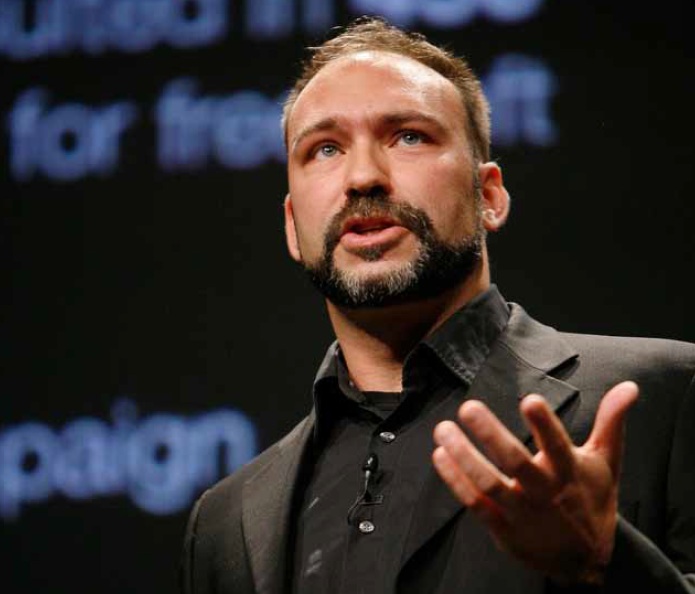
One organisation is using the massive growth in Africa’s mobile technology sector to connect the continent’s population and drive positive social change.
Founded in 2007, the Praekelt Foundation was originally created as an offshoot of the South Africa-based corporate consultancy Praekelt Digital, which creates platforms and applications for mobile phones. “The non-profit Praekelt Foundation really happened because we saw this huge need to provide enterprise-scale models around areas such as health, education, government and agriculture,” explains founder Gustav Praekelt. “There just didn’t seem to be a framework at that point, or any skill in the market at that time, for providing large-scale mobile support to drive social change.”
As mobile penetration in Africa rose sharply, the potential of many of Praekelt Digital’s technologies to connect communities with services and information which had previously been inaccessible to them was becoming clear. “I don’t think anybody expected mobiles to be such a world-changing technology: almost everybody on the entire planet now has a mobile phone. And because it’s become so popular, especially during the last five years, mobiles have suddenly become much cheaper.”
This rise in popularity, coupled with falling costs to the user, has had a profound effect on the way entire continents communicate, he says. “On a basic level, the arrival of mobile has done something absolutely amazing, which is to connect people who were previously completely disconnected from the modern economy. Mobile payments are a great example of this: they have enabled people to carry out transactions virtually, through a mobile phone. But it has also connected people to their governments in order to access health services, agricultural information and educational services. In addition, I think people often forget the acceleration effect of mobile technology, in that peers can connect with peers: you can connect via a very accessible SMS to a vast array of people.”
Recognising the significance of this opportunity, the Foundation began to develop products that could run on mobile devices via one of its two platforms: Vumi, a population-scale platform for handling any type of text message, and Jmbo, used to deliver, create and publish mobile content.
One of the Foundation’s first projects was to partner with the leading African mobile network operator MTN, to add a short message about HIV to MTN’s ‘Please Call Me’ messages (which South African mobile users can send free to any mobile number in the country when they run out of airtime). The result was that 1.5 billion messages were sent out in six languages, and 1.5 million calls were made to the National HIV Hotline—a clear demonstration of the power of mobile in driving social change.
Leading on from this success was the founding of the population-scale network, Young Africa Live (YAL), which is used to drive behaviour change around sexual habits and HIV/Aids for young people in Africa between the ages of 16 and 24. Launched on World Aids Day in 2009, the idea was to create a space where young South Africans could discuss issues such as love, sex, relationships, gender and culture, as well as HIV/Aids. Since its launch, over 970,000 young people have visited YAL to seek information and support from peers and counsellors, with over one million comments posted on the site and more than 36 million page views logged.
“We are so proud of the incredible loyalty and enthusiasm of our audience,” says Gustav. “And what we’re especially proud of is how the community is now taking over the management of the site—our stories are actually coming from the community and the growth to other countries [the network has expanded into Tanzania and Kenya] is also being spearheaded by community members. I’m really proud that we started something small like that and it grew to have a life of its own and exploded across the continent—I think YAL is probably one of our proudest achievements.”
Another exciting example of mobile technology driving real and measurable social change is the initiative the Foundation created around five years ago, enabling South African health facilities to send SMS reminders to patients about their HIV/Aids treatment appointments. “We have measurable proof that we’ve saved thousands of lives with this simple intervention,” says Gustav. “It’s so simple: all we’re doing is reminding patients about their appointments. Before we started, the percentage of people who did not keep their appointments was about 50 per cent, and that has dropped to less than four per cent now— so that’s a huge impact through the simplest intervention.”
Another more recent project is Ummeli, which was launched a couple of months ago and is already used by over 70,000 people. “This came about when we asked our audience what their number one concern was—was it, for example, education, HIV/Aids, or employment?” explains Gustav. When the answer came back ‘employment’, the result was Ummeli: a mobile jobs and community network, accessible through YAL, creating a gateway for people to enter the mainstream economy. Users can create profiles and connect with others, as well as find and share jobs.
Of course, Gustav is aware that the exciting opportunities offered by mobile are all too often accompanied by challenges—and the way to tackle them isn’t always clear. “These population-scale platforms, which are fundamentally different from the way we have communicated to drive change in the past, have allowed us to build things like YAL, which is an incredibly powerful mechanism to drive behaviour change because we can measure the flow of information through this network.
“But the worry we have is that this is completely new: we don’t have any previous models for building these population-scale systems. So if we have a discussion on a sensitive topic, what do we do when people say things within the network which are either damaging, or libellous, or could do harm? An example is the election violence in Kenya five years ago: SMS technology allowed that to spread really quickly. So although technology allows us to create these systems, we don’t yet have the models or the experience to control the spread of information.
“It’s a good challenge,” he clarifies, “but we also need to be aware of the effects of connecting an entire population to each other. Another example was the riots last year in London: in connecting people to each other, things can spread much faster. By their very nature the emerging effects of population-scale networks aren’t as controllable as say, a radio station. So that’s an unequivocal challenge and it’s certainly something that we need to think about.”
Looking forward, the Foundation is set to continue its good work as it strives to keep pace with the pace of mobile penetration in Africa and the inevitable social change it will bring about. “We’re currently working on a very large-scale mobile education project,” Gustav reveals, although he can’t yet divulge too much detail. “The idea is to build a social learning platform that runs exclusively on mobile, accessible or free to anybody in the developing world. One of the partners is the Department for Education in South Africa and there is a major investment bank involved as well. We’ll be formally announcing it within the next couple of months, and we’re very excited about it.”
And what does he think the future holds? “We think the combination of mobile phones and our ability to measure the effect of the flow of information in these population-scale networks is going to create a fundamentally different type of mechanism or tool for us to drive behaviour change in the majority world. To drive social impact or social change, we need to be aware of this new class of tool, this incredibly powerful tool that we have at our disposal.
“Five years from now, we know that every single human being on the planet will have a mobile device,” he continues. “That will be the first time ever in the history of humankind that we will be able to deliver live information to every person on the planet. Our vision is to provide the tools and the platforms that make it possible to deliver the right information at the right time to an individual that will improve or even save their lives. That’s what we hope and believe will come to pass in the next five years,” he concludes. http://praekeltfoundation.org
Written by Becky Done; research by Richard Halfhide












